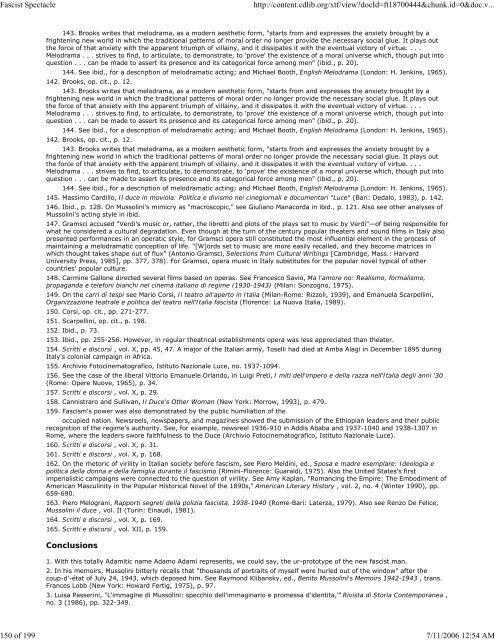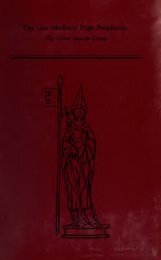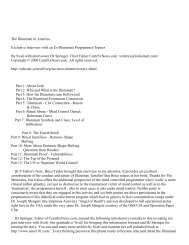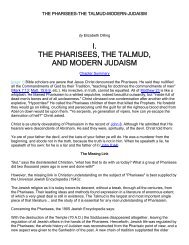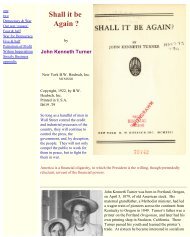Create successful ePaper yourself
Turn your PDF publications into a flip-book with our unique Google optimized e-Paper software.
<strong>Fascist</strong> <strong>Spectacle</strong> http://content.cdlib.org/xtf/view?docId=ft18700444&chunk.id=0&doc.v...<br />
143. Brooks writes that melodrama, as a modern aesthetic form, "starts from and expresses the anxiety brought by a<br />
frightening new world in which the traditional patterns of moral order no longer provide the necessary social glue. It plays out<br />
the force of that anxiety with the apparent triumph of villainy, and it dissipates it with the eventual victory of virtue. . . .<br />
Melodrama . . . strives to find, to articulate, to demonstrate, to 'prove' the existence of a moral universe which, though put into<br />
question . . . can be made to assert its presence and its categorical force among men" (ibid., p. 20).<br />
144. See ibid., for a description of melodramatic acting; and Michael Booth, English Melodrama (London: H. Jenkins, 1965).<br />
142. Brooks, op. cit., p. 12.<br />
143. Brooks writes that melodrama, as a modern aesthetic form, "starts from and expresses the anxiety brought by a<br />
frightening new world in which the traditional patterns of moral order no longer provide the necessary social glue. It plays out<br />
the force of that anxiety with the apparent triumph of villainy, and it dissipates it with the eventual victory of virtue. . . .<br />
Melodrama . . . strives to find, to articulate, to demonstrate, to 'prove' the existence of a moral universe which, though put into<br />
question . . . can be made to assert its presence and its categorical force among men" (ibid., p. 20).<br />
144. See ibid., for a description of melodramatic acting; and Michael Booth, English Melodrama (London: H. Jenkins, 1965).<br />
142. Brooks, op. cit., p. 12.<br />
143. Brooks writes that melodrama, as a modern aesthetic form, "starts from and expresses the anxiety brought by a<br />
frightening new world in which the traditional patterns of moral order no longer provide the necessary social glue. It plays out<br />
the force of that anxiety with the apparent triumph of villainy, and it dissipates it with the eventual victory of virtue. . . .<br />
Melodrama . . . strives to find, to articulate, to demonstrate, to 'prove' the existence of a moral universe which, though put into<br />
question . . . can be made to assert its presence and its categorical force among men" (ibid., p. 20).<br />
144. See ibid., for a description of melodramatic acting; and Michael Booth, English Melodrama (London: H. Jenkins, 1965).<br />
145. Massimo Cardillo, Il duce in moviola: Politica e divismo nei cinegiornali e documentari "Luce" (Bari: Dedalo, 1983), p. 142.<br />
146. Ibid., p. 128. On Mussolini's mimicry as "macroscopic," see Giuliano Manacorda in ibid., p. 121. Also see other analyses of<br />
Mussolini's acting style in ibid.<br />
147. Gramsci accused "Verdi's music or, rather, the libretti and plots of the plays set to music by Verdi"—of being responsible for<br />
what he considered a cultural degradation. Even though at the turn of the century popular theaters and sound films in Italy also<br />
presented performances in an operatic style, for Gramsci opera still constituted the most influential element in the process of<br />
maintaining a melodramatic conception of life. "[W]ords set to music are more easily recalled, and they become matrices in<br />
which thought takes shape out of flux" (Antonio Gramsci, Selections from Cultural Writings [Cambridge, Mass.: Harvard<br />
University Press, 1985], pp. 377, 378). For Gramsci, opera music in Italy substitutes for the popular novel typical of other<br />
countries' popular culture.<br />
148. Carmine Gallone directed several films based on operas. See Francesco Savio, Ma l'amore no: Realismo, formalismo,<br />
propaganda e telefoni bianchi nel cinema italiano di regime (1930-1943) (Milan: Sonzogno, 1975).<br />
149. On the carri di tespi see Mario Corsi, Il teatro all'aperto in Italia (Milan-Rome: Rizzoli, 1939), and Emanuela Scarpellini,<br />
Organizzazione teatrale e politica del teatro nell'Italia fascista (Florence: La Nuova Italia, 1989).<br />
150. Corsi, op. cit., pp. 271-277.<br />
151. Scarpellini, op. cit., p. 198.<br />
152. Ibid., p. 73.<br />
153. Ibid., pp. 255-256. However, in regular theatrical establishments opera was less appreciated than theater.<br />
154. Scritti e discorsi , vol. X, pp. 45, 47. A major of the Italian army, Toselli had died at Amba Alagi in December 1895 during<br />
Italy's colonial campaign in Africa.<br />
155. Archivio Fotocinematografico, Istituto Nazionale Luce, no. 1937-1094.<br />
156. See the case of the liberal Vittorio Emanuele Orlando, in Luigi Preti, I miti dell'impero e della razza nell'Italia degli anni '30<br />
(Rome: Opere Nuove, 1965), p. 34.<br />
157. Scritti e discorsi , vol. X, p. 29.<br />
158. Cannistraro and Sullivan, Il Duce's Other Woman (New York: Morrow, 1993), p. 479.<br />
159. Fascism's power was also demonstrated by the public humiliation of the<br />
occupied nation. Newsreels, newspapers, and magazines showed the submission of the Ethiopian leaders and their public<br />
recognition of the regime's authority. See, for example, newsreel 1936-910 in Addis Ababa and 1937-1040 and 1938-1307 in<br />
Rome, where the leaders swore faithfulness to the Duce (Archivio Fotocinematografico, Istituto Nazionale Luce).<br />
160. Scritti e discorsi , vol. X, p. 31.<br />
161. Scritti e discorsi , vol. X, p. 168.<br />
162. On the rhetoric of virility in Italian society before fascism, see Piero Meldini, ed., Sposa e madre esemplare: Ideologia e<br />
politica della donna e della famiglia durante il fascismo (Rimini-Florence: Guaraldi, 1975). Also the United States's first<br />
imperialistic campaigns were connected to the question of virility. See Amy Kaplan, "Romancing the Empire: The Embodiment of<br />
American Masculinity in the Popular Historical Novel of the 1890s," American Literary History , vol. 2, no. 4 (Winter 1990), pp.<br />
659-690.<br />
163. Piero Melograni, Rapporti segreti della polizia fascista, 1938-1940 (Rome-Bari: Laterza, 1979). Also see Renzo De Felice,<br />
Mussolini il duce , vol. II (Turin: Einaudi, 1981).<br />
164. Scritti e discorsi , vol. X, p. 169.<br />
165. Scritti e discorsi , vol. XII, p. 159.<br />
Conclusions<br />
1. With this totally Adamitic name Adamo Adami represents, we could say, the ur-prototype of the new fascist man.<br />
2. In his memoirs, Mussolini bitterly recalls that "thousands of portraits of myself were hurled out of the window" after the<br />
coup-d'-état of July 24, 1943, which deposed him. See Raymond Klibansky, ed., Benito Mussolini's Memoirs 1942-1943 , trans.<br />
Frances Lobb (New York: Howard Fertig, 1975), p. 97.<br />
3. Luisa Passerini, "L'immagine di Mussolini: specchio dell'immaginario e promessa d'identita,'" Rivista di Storia Contemporanea ,<br />
no. 3 (1986), pp. 322-349.<br />
150 of 199 7/11/2006 12:54 AM


